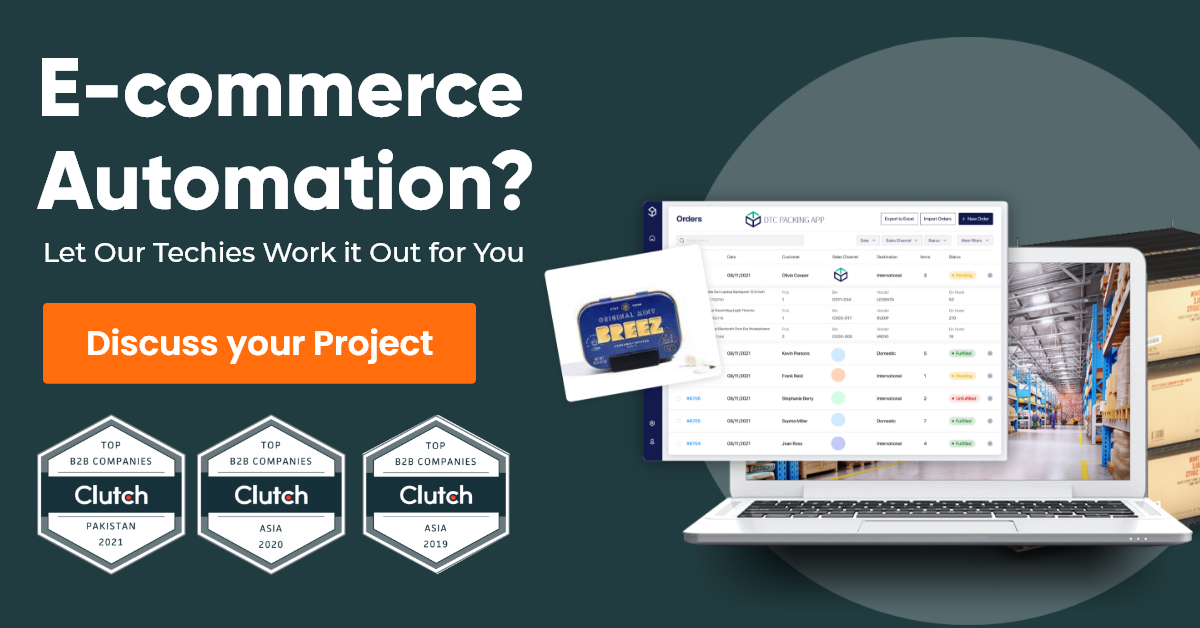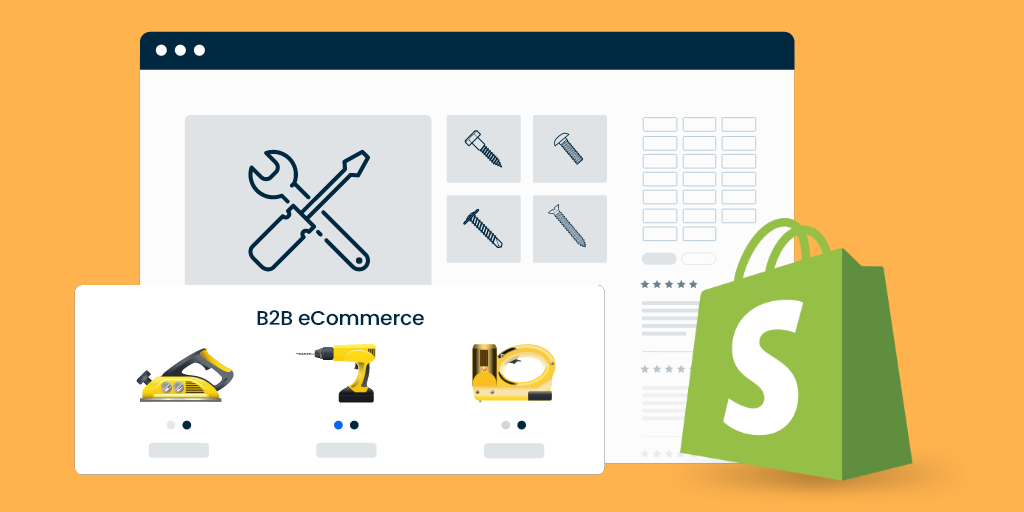Ecommerce Integrations You Need for Automated Operations

One of the greatest things about setting up an eCommerce store is its accessibility. Think about it, anyone can set up an online platform to sell their products and services. However, it is not a cakewalk for eCommerce businesses to manage their daily operations without being in sync with the other business platforms. Read on to understand all about ecommerce integrations.
The Role of Integration for an Automated eCommerce Platform
Businesses in today’s competitive eCommerce landscape depend on isolated applications and data sources to bring their online store to the top and deliver a seamless shopping experience. These tools and applications may include POS systems, payment gateways, return management, and much more. These tools serve certain business needs but often fail to ensure a seamless process when disconnected from each other.
To ensure a smooth process, data needs to be seamlessly transferred from one application to another. Confused? Consider this: a customer placed an order that needs to be delivered. However, the sales order data of your ecommerce platform is required by the warehouse management system to ensure a seamless order delivering process. However, without an integrated and automated system in place, data transferring is slow and prone to errors. These inefficiencies in order management can lead to customer dissatisfaction and increased operational time, ultimately driving the customers away.
Integrating disconnected applications and data sources automates business processes resulting in less overhead time, better conversion rates, and revenue. Not just that, it also helps in analyzing market gaps and recognizing trends for strategic planning and decision making.
Also Read: 9 Timeless Ways to Increase Conversions
So, if you have not yet decided on the eCommerce automation tools for your business, it is critical to get started with them now. But before we move on to how the integration works for automation, let’s discuss the eCommerce automation tools for your business.
5 Tools for an Integrated and Automated eCommerce Store
1. Hubspot
Source: Hubspot
Hubspot is one of the greatest and best inbound marketing tools for eCommerce businesses. It hosts various features such as content management, email marketing, social media handles, and analytics. In simple words, it is a complete eCommerce marketing solution.
Hubspot also enables the business owners or related individuals to manage the entire sales funnel. Not just that, it is great for personalizing marketing strategies and scale marketing activities for your eCommerce store.
Check out our article on: Eleven Ecommerce Marketing Strategies To Jump Start Your Digital Game
Key Features:
- Email campaigns
- Landing pages
- Abandoned cart nurturing
- Upsell campaigns
It is a paid tool for businesses and professionals but also provides cost-effective solutions to new individuals on the platform.
2. QuickBooks
QuickBooks is a leading accounting software online that provides a complete package for eCommerce stores. It enables businesses to create invoices, generate reports and keep a check on the incurred costs. This tool is best for small to mid-sized level companies.
QuickBooks has a creative visual interface and can be operated on multiple platforms. As said above, it is complete accounting software that organizes and manages multiple tasks, all in one place.
Key Features:
- Compatible with computers, laptops, and smartphones
- Account creation and shareability
- Custom invoice templates and generates reports
- Unlimited customer support
It is a cost-effective accounting solution for businesses.
3. Mailchimp
Image Source: Pinterest
A popular email marketing platform, Mailchimp is best suited for mid to large-scale eCommerce businesses. It automates the online store with targeted email campaigns based on customer purchasing activities and website engagement.
Mailchimp is an intuitive tool that lets you know more about your customers and gather data that later helps in creating personalized emails for the customers. It also assists in boosting conversion rates and turnover for an eCommerce store
Key Features:
- Pop-up forms
- Email campaigns and product retargeting emails
- Digital and social media ads
- Recover abandoned carts
It is a cost-effect email marketing tool that provides three pricing plans along with a free plan for users.
4. Shopify Launchpad
Image Source: Digital Operative
One of the best automation apps for eCommerce store owners on Shopify is using Shopify Launchpad. This app allows you to automate any upcoming event or campaign and schedule them from the beginning to the end. Not just that, it also allows you to review campaign performance from the beginning to the end. From updating inventory to setting collection discounts for set sales and discount dates, it does it all.
Key Features:
- Creates preset discounts
- Design and schedule campaign themes
- Pre-schedule changes to return to your standard form at the end of any event
- Schedule product promotions to publish across multiple sales channels.
This tool is for Shopify plus users and is free to install.
5. ChannelApe
ChannelApe manages an eCommerce store’s warehouse and shipping requirements in a unified system. It is a highly customizable system that can support all warehouses around the globe.
Key features:
- Capable of order targeting
- Carrier rate shopping
- Distributed order management
Its starting price is $350/month.
6. Zapier
Where the five tools mentioned above are individually essential to manage certain important aspects of an eCommerce store, Zapier works as the key tool for business automation on the whole. In simple words, business owners, instead of being engaged with multiple apps on the eCommerce store, can simply integrate all applications on a single platform of Zapier.
Zapier can integrate more than 3000 apps and automate lengthy and time-consuming workflow in a matter of minutes. It can help save time and boost the productivity of your online store.
Key Features:
- Unlimited premium app integration
- Unlimited users
- Shared workplace and app connections
- Create additional workflows
It has four pricing plans along with a free program for new users.

eCommerce Integrations — Common Challenges
Challenge 1: Your Sales, Marketing, CRM, ERP, and Fulfillment Systems are Disconnected
An eCommerce business relies on various tools and software to manage its marketing, sales, and order processing functions. However, when it comes to duplicating data across systems creates a high risk of errors and receiving inaccurate inventory levels, untraceable orders, or wrong shipping data.
This is where integrations come to save the day. With integrations, data transfer between systems is automated, maintaining accuracy and mitigating errors. When data is always up-to-date, you function from a single source and make operations more efficient.
Challenge 2: Your Staff is Burdened With Manual Activities and Processes That Require Time
Being an eCommerce store, the sales rep must interact with the customers. However, it doesn’t mean they have to manually enter data into a system. Sales or customer representation is a repetitive task and needs an automated system to free up time.
With an integrated and automated system, your business processes will be faster and easier. It frees up the time of the sales representatives, giving them more time to interact and cater to the problems of the customers. In addition, it saves money that can be reallocated to more critical aspects of the business.
Challenge 3: Lack of Relevant Data for Informed Decision-Making and Addressing Growth
As your eCommerce business grows, so do the costs and time necessary to invest in your industry. Along with that, there is a boost in your finance, operations, inventory, and customer data.
With the right tools, it can make managing growth easier. Integrated automating tools can help you make an effective business decisions as you grow. When you have accurate data, you can create contextual and relevant reports. This empowers your business to meet the customer’s expectations and offer personalized content. It also helps make the right business decisions, ultimately leading to business growth.
Challenge 4: You Want to Improve Customer Experience With More Control, Personalization, Transparency, and a Self-Serve Model
Customers look forward to a good experience when it comes to shopping online. They seek transparency in services and order status, the way they want to access order history, and the freedom to change their orders. At the same time, they are looking for efficient interaction and response.
Automating support using tools and systems such as Chatbots can free up company resources while guiding the customers to what they are looking for. It also leads to better interaction with the customers leading to customer satisfaction and increased sales.
eCommerce Integrations — Why Do You Need it?
As an organization grows, dealing with administrative duties can distract from planned objectives. Efficiency suffers, and decision-making is affected, leading to cost spikes. Therefore, eCommerce processes and workflows require constant monitoring and evaluation, as these functions, if improved, can result in a spike in revenue generation and working capital. To make you understand better, here are some ways integration can help and support eCommerce business growth.
Integration Can Help With Visibility
Undoubtedly, being an eCommerce business owner, you will be using numerous tools to support your business and its support. However, as you grow, a lot of customer data will be distributed across different systems and platforms. As said above, this can cause errors and inaccurate data entry that can affect your decisions.
Consider this, your CRM already contains intricate details about your customers that are further utilized to personalize your marketing campaigns. However, integrating your CRM with other backend systems, such as the order management system, can further improve the user experience of the customers. Doing this can help you see the past orders of the customers when you sort them into your eCommerce store marketing list or invest in direct advertising.
Not just that, you can also integrate your enterprise Resource planning (ERP) solution with your system. Having an integrated ERP system can help you eliminate redundant business processes and streamline workflows, reducing human errors, saving time, and ensuring that your team is meeting critical business needs.
Integration Informs Business Intelligence
As a result of having greater store visibility and control over data, integration platforms also help support your business intelligence initiatives.
These tools handle extract, transform and load operations that allow businesses to find, manipulate and share data across various systems. Using integration tools can unlock real-time insights directly driven by the data you have on hand.
Integration Can Help Achieve Significant ROI
Automating manual processes and streamlining efficiencies through integrated eCommerce automation tools can significantly enhance an organization’s chance of success. Cost can be reduced while providing new working capital, and resources can be allocated to concentrate on other critical business requirements.
With an integration solution in place, there are no restrictions for future expansion and growth. Any new business system introduced can easily be integrated with the eCommerce platform and vice versa.
Conclusion
So why are eCommerce tools integration necessary? Because it helps supercharge and automate business operations while cutting time out of your workday. With the right tools, businesses can increase their conversions, sales, and team productivity up to 50%.
So, if you are looking forward to automating your eCommerce platform with the right integration tools, Codup is the tech partner you need!
Codup offers top-notch eCommerce website development services.




